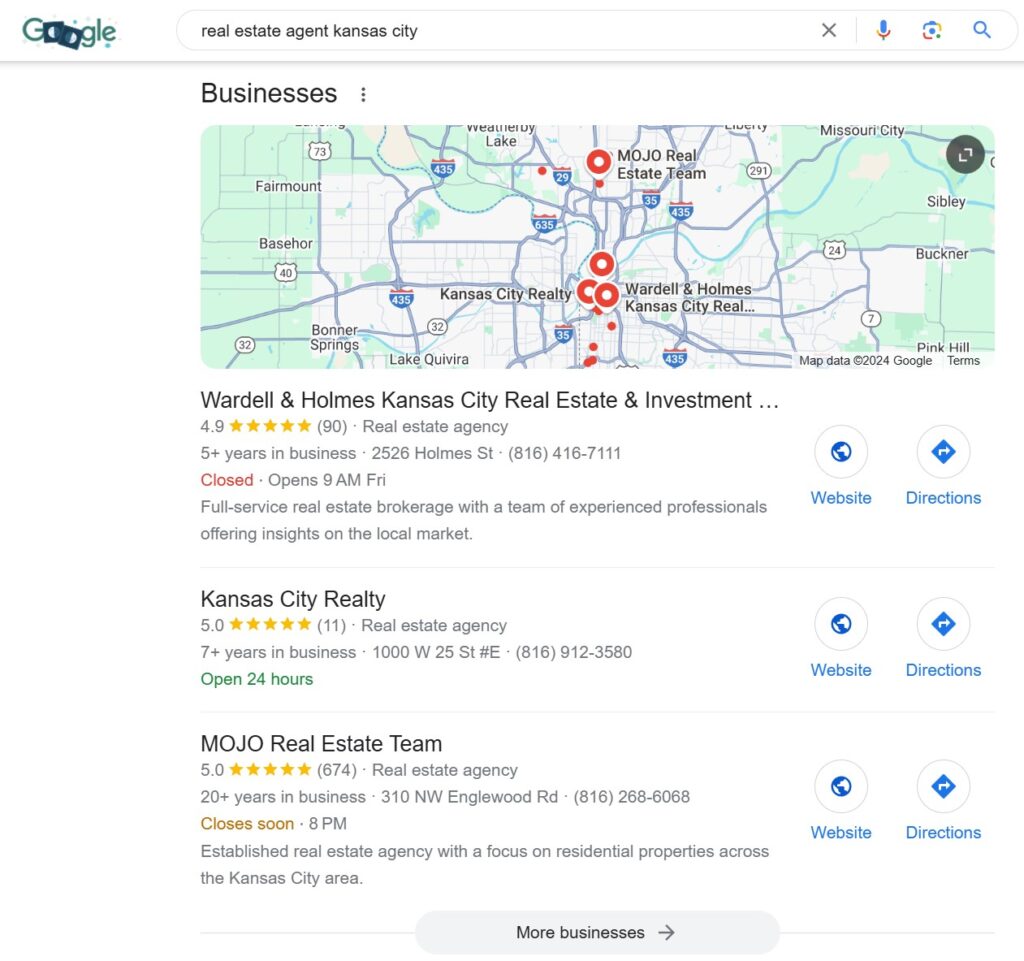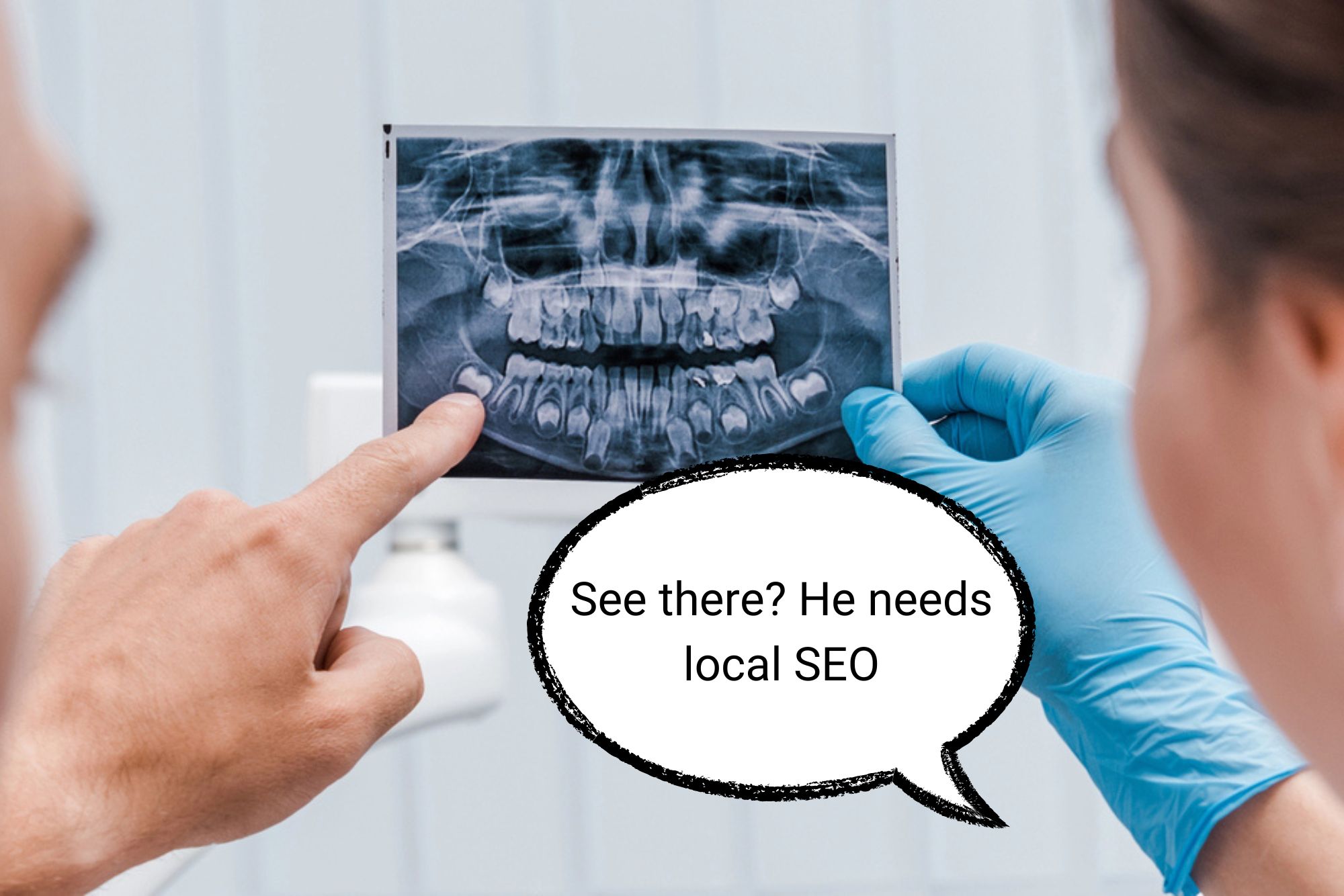Here’s the thing about being a real estate agent in today’s world—you’re not just selling homes; you’re selling yourself. And in a market where your competition is a click away, the way you show up online can make or break your business. That’s where local SEO comes into play.
In this real estate local SEO guide, I break down how to make sure you’re the agent people find first when they Google “best real estate agent near me.” We’ll talk about what local SEO is, why it matters for your business, and, most importantly, how to use it to connect with buyers and sellers in your community.
Whether you’re a veteran real estate agent or just starting out, this guide is here to demystify local SEO and make it work for you. Let’s get to it.
What is Local SEO and Why Does It Matter for Real Estate?
Let’s start with the basics: what is local SEO?
Simply put, it’s the strategy of making sure your business shows up when people in your area search for services like yours. For real estate agents, this means appearing in search results when potential clients type in things like “real estate agents near me” or “homes for sale in [your town].” Local SEO helps connect you to people actively looking for what you offer—and doing it better than your competitors means more leads coming your way.
At the heart of local SEO is your Google Business Profile. This is where you list key details like your office location, contact info, and business hours. Pair that with consistent review management—because yes, potential clients care about your ratings—and you’re building trust before they even pick up the phone. Then, there’s your website. Optimizing it with the right keywords, fast load times, and mobile-friendly design ensures search engines know you’re the real deal.
Local SEO isn’t just about showing up—it’s about showing up ready to impress.
Mastering Your Google Business Profile as a Real Estate Agent or Realtor

Your Google Business Profile (GBP) is your ticket to standing out in local search results and capturing leads who are already looking for what you offer. Setting it up is relatively straightforward, but optimizing and managing it is where the magic happens. Let’s walk through the steps to ensure your profile not only gets clicks but converts them into calls.
First, start with your real business name. Resist the temptation to stuff it with keywords like “Top Realtor in [City]” because Google isn’t a fan of those tricks, and it can get your profile flagged. Use your real business name—it keeps things consistent and professional. Next, input your address, phone number, and email address. I recommend showing a physical address (even if you work remotely) because profiles without one tend to have limited reach. If you’re hesitant about listing your home address, consider a co-working space or virtual office option.
When it comes to categories, pick the one that aligns most closely with your services—“Real Estate Agent” is usually the best choice. Add secondary categories like “Real Estate Consultant” or “Real Estate Agency” if they apply. This helps Google understand the full scope of what you do, making it easier for potential clients to find you in a variety of search scenarios.
Photos and videos play a role in how people perceive your profile. Upload high-quality pictures of properties you’ve sold, your office (if you have one), and even yourself to add a personal touch. Videos showcasing your personality or giving a quick home-buying tip can also make your profile more engaging. Keep these assets updated, so your profile feels active and relevant.
Now, let’s talk reviews. Reviews are the lifeblood of a successful Google Business Profile, so make them a priority. Ask happy clients to leave a review after closing a deal, and make it easy for them by sending a direct link. Respond to every review—good or bad. For positive feedback, show gratitude. For negative ones, respond professionally and offer to resolve any issues. This not only builds trust but also signals to Google that you’re an engaged business owner.
Don’t neglect the small details. Make sure your business hours are accurate and keep them updated for holidays or special circumstances. Write a compelling business description that highlights what makes you unique. Focus on your expertise, the areas you serve, and the types of clients you help. Sprinkle in some relevant keywords, but keep it natural.
Once your profile is up and running, the work doesn’t stop. Regularly update it with posts about new listings, open houses, or tips for buyers and sellers. Treat it like a mini social media platform to keep your audience engaged. Google rewards active profiles with better visibility, so stay consistent.
Finally, track your performance. Use the Google Business Profile dashboard to monitor metrics like views, clicks, and calls. These insights can help you refine your strategy over time and focus on what’s driving results. Managing a GBP might sound like a lot, but when done right, it’s one of the most effective tools in your local SEO arsenal.
The Power of Reviews: Building Trust and Visibility
Positive reviews are the cornerstone of a successful Google Business Profile. Real estate agents should prioritize collecting reviews from happy clients by making it part of their post-sale process—ask in person, send a follow-up email with the review link, or include a reminder with their final paperwork.
Responding to all reviews, whether glowing or critical, shows professionalism and a commitment to client satisfaction. Reviews don’t just boost your credibility; they also signal to Google that your business is active and trustworthy, improving your profile’s visibility in local searches.
Keyword Research for Real Estate Agents: Finding the Right Search Terms
Effective keyword research is the foundation of any local SEO strategy, and for real estate agents, it’s all about finding terms that potential clients are actively searching for. Start by selecting a keyword research tool that fits your budget and needs. If you’re just getting started, affordable options like Keysearch or Keyword Chef can do the job without breaking the bank. If you’re looking for advanced insights and additional functionality, consider premium tools like Ahrefs or SEMrush—but keep in mind they come with a steeper price tag and may offer more features than you need early on.
Once you’ve got your tool, begin with seed keywords like “real estate agent + [your location].” These straightforward terms are often your bread and butter since they typically have the highest search volume for location-based queries. From there, use your tool to uncover related secondary keywords, such as “homes for sale in [your location]” or “top realtors near me.” These can be sprinkled strategically throughout your content to support your main keyword and capture additional search traffic.
The key is balance. Focus your location pages on the high-volume, primary keywords, but don’t ignore the long-tail variations that can bring in niche traffic. With thoughtful research and a clear strategy, you’ll ensure your website is targeting the terms that matter most to your potential clients.
Building a Real Estate Website Structure That Boosts Local SEO
When it comes to building a website that’s optimized for local SEO, the key is creating a clear and logical structure around your primary keyword. For instance, if your target keyword is “real estate agent Kansas City,” you would focus on building your homepage around that term. This page should include information about your services, expertise, and the areas you serve, all while naturally incorporating your primary keyword.
The next step is to create separate location pages that target the surrounding cities where you offer services. For example, you could have pages for “real estate agent Overland Park” or “homes for sale in Lee’s Summit.”
While there are various ways to structure these location pages, one thing remains clear: don’t target the same keyword across multiple pages. If you do, you’re risking the pages competing with each other, which can negatively affect your rankings. Instead, assign a unique primary keyword to each page and make sure the content is tailored to that specific location. This approach ensures each page has a clear focus and avoids internal competition, helping improve your site’s overall SEO performance.
Strengthening Your Real Estate Website with Effective On-Page SEO
On-page SEO is about optimizing the content on your website so that search engines understand exactly what each page is about. As mentioned in the previous section, start by selecting a primary keyword or topic to target for each page. From there, you’ll want to incorporate synonyms and related terms throughout the content to ensure it reads naturally and signals relevance to search engines. For instance, if your page is about “real estate agent Kansas City,” you can include related terms like “homes for sale,” “property listings,” or “buying a house” to strengthen the page’s topical relevance.
The primary keyword should appear in key places such as the title tag, meta description, H2 headings, and throughout the page content—but don’t overdo it. The goal is to ensure the keyword appears naturally, without stuffing.
Beyond the obvious keywords, local SEO professionals also focus on what’s known as entity optimization. These are related terms that aren’t necessarily traditional keywords but still help Google understand the context of your content. For example, a page targeting “real estate Kansas City” may also mention “bedrooms,” “homes,” or “neighborhoods” because these are concepts closely associated with real estate.
To help uncover these related terms, on-page SEO tools like SurferSEO or Frase.io can be incredibly useful. Even if you’re well-versed in real estate terminology, these tools can show you the entities and terms that are ranking alongside your target keywords. By using these related terms at a reasonable frequency, you enhance your content’s chances of ranking higher in search results while keeping it informative and engaging for your audience.
Building Citations and Backlinks for Your Real Estate Website
Building citations and backlinks is a crucial part of improving your website’s local SEO performance. Citations are simply mentions of your business’s name, address, and phone number (NAP) on other websites, like local directories such as Yelp or Yellow Pages. While they don’t carry as much weight as they once did, citations still show Google that you’re a legitimate local business and contribute to your credibility. You can build citations manually by submitting your business information to these directories, or use tools like BrightLocal to simplify the process and ensure consistency across platforms.
Backlinks, on the other hand, are far more impactful. When other websites link to your real estate website, search engines like Google treat these backlinks as a vote of confidence. The more high-quality backlinks you earn, the higher your website’s chances of ranking well. But don’t be fooled—building quality backlinks takes effort. Links from trusted, authoritative sites like local news outlets or respected real estate publications can significantly improve your SEO.
Some effective strategies for earning these high-quality backlinks include guest posting on reputable sites, creating linkable assets like real estate industry statistics pages on market trends or home inspections (which naturally attract links), and digital PR efforts. By consistently building strong citations and earning valuable backlinks, you’ll improve your website’s authority and increase your visibility in search results.
Why Mobile Optimization Matters for Your Real Estate Website
In today’s digital landscape, mobile optimization is essential for real estate agent websites. With the majority of web traffic coming from mobile devices, it’s important that your website is easy to navigate and visually appealing on smartphones and tablets.
A mobile-friendly site not only enhances the user experience but also boosts your rankings in search engines like Google, which prioritize mobile-optimized pages.
If your site isn’t mobile-friendly, you risk losing potential clients who are browsing on their phones.
Implementing a Strong Local SEO Strategy for Your Real Estate Business
To succeed in local SEO, real estate agents need to take a strategic, consistent approach. From optimizing your Google Business Profile and creating location-specific pages to building quality backlinks and ensuring your website is mobile-friendly, every step contributes to increasing your online visibility. By staying focused on the right keywords, enhancing your content, and engaging with your audience through reviews, you can significantly improve your local search rankings.
At Galactic Turtle, we specialize in helping local real estate agents and realtors implement effective SEO strategies to generate leads and grow their businesses.
If you’re ready to improve your online presence and attract more clients, we’re here to help with our real estate local SEO services.
Let’s talk about how we can take your SEO to the next level.


